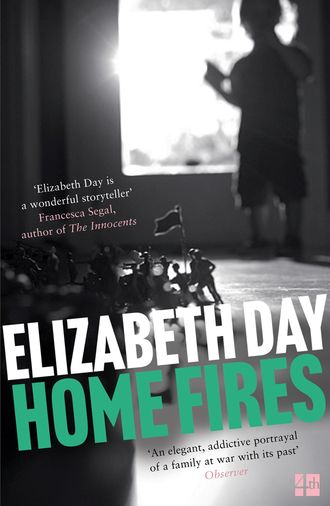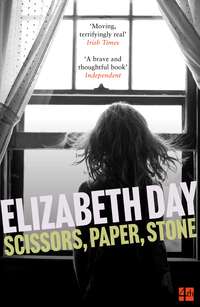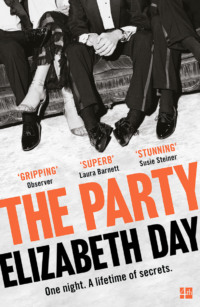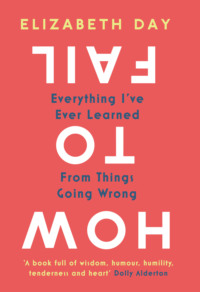
Полная версия
Home Fires
‘Well, darling, what on earth do you intend to do? Sweep the streets?’
Max grinned and patted her hand. ‘Fear not, mother dear. I don’t intend to end up destitute or homeless.’
‘And before you get any ideas, let me tell you I certainly won’t be doing your stinky washing any more,’ she said, punching him lightly on the arm. Max squinted with pretend pain. ‘Ow!’ He grinned. ‘Mum, you don’t know your own strength.’
She laughed. Then she saw Andrew out of the corner of her eye, his face set in rigid lines of worry and disapproval. She wanted to reach out to him, to rest her hand on his arm and tell him it was going to be all right. But she felt torn. She did not want Max to feel she was taking sides. So she waited.
‘What are your plans, Max?’ Andrew asked after a while.
‘I thought I’d join the army.’
There was a stunned silence, broken only by the sound of Max chewing on a piece of steak.
Andrew put down his knife and fork.
‘The army?’
Max nodded. He pushed his unfinished dinner to one side, the plate still heaped high with potatoes and limp green beans. The butter from the fried mushrooms was congealing at the edges, like wax.
‘Where on earth did you get that idea from?’ asked Andrew. Caroline looked at her son and noticed his eyes getting darker. She didn’t want there to be a scene.
‘We never realised you were interested in the military,’ Caroline said, trying to be conciliatory. It seemed to work. Max’s shoulders relaxed. He was still wearing his tatty brown denim jacket for some reason. Perhaps he had been on his way out somewhere – he had an incredibly active social life – but the brown bagginess of the material combined with his uncontrollable mop of hair gave him the air of an enthusiastic teddy bear. She had to stop herself from reaching out and pushing the floppy strands of blond hair away from his forehead.
‘It’s something I’ve been thinking about for a while,’ he said. ‘I know it’s not what you wanted or expected for me and I’m sorry for that, but you’ve always taught me that it’s important to do what you love –’
‘Within reason,’ Andrew interjected.
‘OK, well, I know I’m good at schoolwork and exams –’
‘You’re more than “good”, Max. You’re academically gifted. Your teachers are talking about Oxbridge.’
‘Dad, please let me finish. I might be good at school but I don’t love it.’
‘What do you love?’ Caroline asked.
‘I love being part of a team. I love sports and being captain of rugby and people respond to me, Mum, they do. I’m a good leader. I like that about myself. But most of all I like the thought of doing something that counts. That really, truly counts for something.’
‘Oh come on, Max,’ said Andrew. ‘Wanting to make a difference is not the same thing as offering yourself up to get killed.’
‘Isn’t it?’ Max looked at them both steadily, still slouched on the table, his chin propped on his hand as if this were the most casual discussion in the world.
Neither Caroline nor Andrew knew what to say to that.
‘How can you truly change anything unless you’re willing to die for it?’ Max asked and it sounded like something he had heard, a phrase to be played with like a picked-up pebble.
‘Well, that’s very philosophical of you, Max, but I don’t think you know what you’re talking about . . .’
‘Have you thought of going to university first and then making a decision?’ Caroline suggested. ‘At least then you can leave your options open.’
But she could tell, even as she was mouthing the words, that there was nothing either of them could do to change his mind. There was something about the way Max was talking, something about the utter certitude with which he met his father’s eye, that made Caroline realise he thought he had found his vocation. She had never heard him so determined.
They found out later that a serving officer had been to speak at the school, invited by the politically correct careers department who were no doubt keen to introduce the pupils to a representative cross-section of society. In the same month, the school also hosted talks by a high court judge and the home affairs editor of a national newspaper. For whatever reason, Max was not enthused by what these two had to say. It was the army officer who inspired him and, as with the model airplanes and tennis practice and as with Adam, his best friend, Max had given himself over entirely to the idea of becoming a soldier and would remain loyal to it until he died.
To Caroline’s surprise, Elsa gave her unequivocal backing to Max’s decision. Part of her wondered whether her mother-in-law was doing it deliberately, to show her up for her failings, to show her that she had never deserved the privilege of being Max’s mother or Andrew’s wife.
Elsa’s phone call came on a weekday morning, when she must have known Andrew would be at work. Caroline immediately assumed her brightest telephone manner, obscurely flattered by the fact Elsa had chosen to speak to her and her alone. Normally, she would only have gone through the motions with Caroline – how are you, how’s Max, how’s the garden, what are you having for supper, that kind of thing – until, after a reasonable interlude, she could ask to speak to Andrew, as if Caroline were simply some sort of conversational gatekeeper that had to be got through. But on this day, it was different.
‘Caroline, it’s Elsa,’ she said, even though the kitchen telephone had already flashed up with her number.
‘Hello, Elsa. How are –’
‘You simply must allow Max to join the army,’ she said, cutting in. ‘He’s told me all about it.’
‘Max has told you about it?’ Caroline asked, incredulous. When had he done that?
‘Yes, he called me last night and he says you and Andrew are opposed to it.’
Caroline felt her shoulders tense. ‘We’re not opposed,’ and a note of defensiveness crept in to her voice.
Elsa backtracked. ‘No, I’m sorry, I didn’t mean to say that. What he said was that you were trying to be supportive but he could tell your heart wasn’t in it.’
‘Well, Elsa, I don’t think that’s so surprising.’
Her mouth was dry. She disliked the idea of Elsa currying favour with Max, of exploiting a momentary lapse in her judgement. She disliked the thought of the two of them being close, forming an alliance that excluded her.
‘No, of course not,’ Elsa said. ‘I’m sure it must be very difficult to think of your son in that kind of danger but Caroline, you must realise . . .’ And the next words were so surprising, Caroline was not at first sure she had heard them correctly. ‘You must realise that young men need to fight. They need to get it out of their system.’
Caroline was so taken aback that she did not think to question then why Elsa said it. It seemed such a curious statement of fact from an elderly lady whose only son was an accountant. What could she possibly know about a young man’s need to fight?
Elsa carried on talking. ‘I’m worried that if Max doesn’t do this, he’ll end up feeling he’s never proved himself. He’ll take it out on someone or something else. He’ll make stupid decisions. He won’t want to be thought of as a coward.’
‘But . . .’
‘There, I’ve said enough,’ Elsa said, resuming her customary briskness. ‘I’m sure you think this is none of my business, Caroline, but for reasons I can’t go into, I feel very strongly about this.’ And then she put the phone down.
Caroline did not tell Andrew about the conversation but she soon came to realise that unless she showed Max her wholehearted support, she would risk pushing him away. He would seek out other friends, people who were more sympathetic to his ambitions – people like Elsa. The thought of this scared her. She did not want to lose him. So she gave Max her blessing. In time, Andrew had followed.
There was no stopping Max after that. He signed up to 1 Rifles, part of the 12 Mechanised Brigade based in Bulford and when his parents went to Wiltshire for his passing-out parade after thirty-eight weeks’ basic training, he stood proud and bold in front of them, his hair shaved short, his shoulders broad and bulked-out underneath the uniform and Caroline wore a bright red hat and Andrew wore a dark grey suit and they clapped along with all the other parents and smiled and flashed their digital cameras and shook their heads in shared disbelief at how grown-up their children seemed. Max, surrounded by friends, his tired eyes gleaming, was in his element.
She has a photograph from that day of the two of them, taken by Andrew. In it, Max is laughing, his handsome head tilted backwards. He has his arm around her and Caroline remembers that the stiffness of his uniform made his movements unnaturally heavy. She has her hand on his chest, lightly resting just below his heart and her lipsticked mouth is stretched into a smile that manages to be both joyful and anxious. But Max . . . well, Max looks wonderful.
Sometimes, now, Caroline will see other bereaved families on the evening news who have been trotted out for the television cameras by the Ministry of Defence and they look like half-people, their ghostly outlines blurred from the ghastliness of their grief. They look slumped and shattered, shuffling forwards as if their spines are sagging, grey-faced and shaken and not quite comprehending the all-encompassing reality of what they have just been told. Often, these families will have a statement that they wish to read out. Most of the time, this statement will contain a line about how, in the midst of this terrible tragedy that has engulfed them, they take comfort from the knowledge that Paddy or Niall or Ian or Geoff or Ben died ‘doing what they loved’.
Perhaps, Caroline thinks, it should give her succour now to think that Max died doing something he loved so much. But it doesn’t. It makes her angry that he chose to put himself in danger. It makes her angry that no matter how much she loved him, it wasn’t enough, that he needed something else. It makes her angry that he’s dead. And, above anything else, it makes her angry that she was too gutless to stop him.
Because, after all, what is the point of a mother if she cannot protect her only child?
His body – what there was of it – was flown back on a military plane. They were driven up to RAF Lyneham in a plush black Mercedes provided by the army and although they held hands in the back of the car, Caroline felt completely separate from her husband. She rested her head against the window, watching the motorway service stations skidding by, the spindly trees caked in exhaust fumes, the dull, overcast sky that seemed to stretch for ever in a uniform pale brushstroke, and she could feel nothing. She was numb, empty, hollow.
‘You OK?’ asked Andrew, turning to look at her with dark-circled eyes.
She didn’t answer. She tried to nod her head but it felt like a lie.
Once they got there, they lined up with the other bereaved parents in a surreal sort of welcoming committee. One of the mothers, a thin streak of a woman with badly cut hair, smiled at Caroline and then started crying so that for a moment it looked as though her face had been split into two halves in a game of consequences.
Three coffins covered in Union flags were carried out of the plane’s hull in slow succession, each one held aloft on the shoulders of six uniformed men who walked with respectful sombreness across the tarmac. It was very windy and Caroline’s hair kept slapping across her face.
The woman who had smiled at her was now crying uncontrollably, segments of a balled-up paper tissue in both hands. Her husband had his arm around the woman but kept looking straight ahead, his gaze masked, two thick wrinkle-lines etched from the corners of his mouth down either side of his chin.
Andrew’s arms were crossed. His head was angled to one side so that she could only just make out the pinkish trace of a shaving cut on one side of his cheek. A tear, translucent and slippery as a slug’s trail, was falling down his face. Caroline was surprised to see it there and she realised that, until now, she had never once seen Andrew crying.
The sight of him – vulnerable but trying not to be for her sake – moved her. She held out her gloved hand and he took it, gratefully. But then, with her hand in his, she started to feel trapped, as if she were betraying something, as if to be thinking of anyone else but Max in this moment was a form of disloyalty. For so long, she had relied on Andrew to be her rock. But now, she did not want him near her.
For her part, Caroline had no tears. She found that her grief was so vast it blanked everything else out. It was as though she were in the middle of a storm, perfectly calm at its epicentre but looking outwards at the whirling mayhem, the engulfing waves and thunder-split skies, the spiralling madness of normality ripped apart at the seams.
As she watched the soldiers carrying the coffins across the tarmac, she found herself remembering – of all things – the time she took Max to have his warts treated with liquid nitrogen at the hospital. He was 10 and his middle finger had bubbled up, the skin becoming hardened and nodular. None of the over-the-counter wart treatments worked, so they had driven one morning to the hospital, Max sitting in the front passenger seat, holding his finger up to the light to examine it better.
‘Why can’t I keep my wart?’ he said in his plaintive, inquiring way.
‘Because it’s contagious.’
There was an effortful silence as Max considered this.
‘What does contagious mean?’
‘It means . . .’ she pondered how best to describe it. ‘It means other people can catch them.’
‘Like a ball?’
‘No, like the flu.’
That seemed to satisfy him and he was very brave with the doctor, pressing his hand down on to the table as he was told, trembling only the tiniest bit when the liquid nitrogen was applied with the tip of a cotton bud. But Caroline could tell it hurt because he blinked quickly three times which was exactly what he had done two summers previously after fracturing his elbow falling off his new bicycle.
As they walked to the hospital car park, she asked him whether it had hurt.
‘Yes,’ he said. ‘But I don’t know how it felt.’
She looked at him, surprised. ‘What do you mean?’
‘It felt really hot but it also felt really cold and I couldn’t work out which it was. It hurt too much to know.’
Eleven years later, watching him come back to her in a box and a body-bag, that was how it was for Caroline: too painful to know what she was feeling.
The casualty visiting officer, a whey-faced woman called Sandy, told them that the army would pay for Max’s funeral. She told them this as if it were a great favour.
‘So you and Mr Weston won’t have to worry about any of that,’ she said, with a sympathetic expression that looked as if it had been ordered from a catalogue of necessary human emotions. Caroline was in the middle of making her a mug of tea. Instead of answering, she asked: ‘Do you take sugar?’
‘Yes, two please.’
Two sugars, thought Caroline, how common. She had stopped taking sugar years ago after Elsa had commented, devastatingly, on her ‘terribly sweet tooth’.
Still, Caroline thought to herself as she stirred the loose leaves into the pot, there was no accounting for taste.
She brought Sandy’s tea to the table. They were sitting in the kitchen, in the extension they’d had built after Max left for his training in Bulford. It had sliding windows that opened on to the garden and the light that day was streaming through, showing up the dusty streaks and cobwebs that Caroline hadn’t got around to cleaning from the glass. You couldn’t see the Malvern Hills from the kitchen but you could feel their presence, crouching like cats across the horizon.
Andrew, sitting across from Caroline with a file of papers in front of him, nodded at the officer absent-mindedly and made a note of something on the uppermost sheet of typed A4. Sandy was looking at her expectantly, clearly worried that Caroline wasn’t taking anything in. ‘The army will pay for the funeral, for everything,’ she emphasised, enunciating each word with extra care.
Something about the way she spoke, in that patronising, slow voice used by teachers when a child is failing to grasp an elementary fact, made Caroline snap.
‘Am I meant to be grateful for that?’ she said. Andrew looked at her cautiously.
‘The army will pay for his funeral? Well, that’s terribly good of you,’ Caroline continued, her voice squeezed tight. ‘How kind. Still, I suppose it’s the least you can do given that you were the ones who killed him.’
Sandy coughed uneasily. Andrew reached across the table and put his hand over Caroline’s. She snatched it away.
‘They are doing the best they can, Caroline,’ he said in a level voice.
She stared at him. She could not understand why he insisted on being so reasonable.
‘They killed our son.’
He shook his head. ‘No, darling, no they didn’t.’
‘They sent him there.’ Caroline could hear her words getting higher and more frantic. He had never listened to her, ever. He had never believed her opinions were worth having. She felt that she had to shout, to be louder than he was, just to make him hear what she was saying. ‘They ordered him out on patrol so that he could step on a fucking landmine!’
The swear word sliced through the room. Sandy put her mug of tea down carefully on a coaster.
‘Mrs Weston, I didn’t mean to . . .’
‘Don’t . . .’ she said. And then, more quietly, almost apologetic: ‘I’m sorry, but you have no idea.’
She stood up with such a jolt that the chair toppled over and clattered against the floor.
‘Caroline,’ Andrew said. ‘Calm down.’
It was those words that tipped her over the edge. Arms crossed, she dug her fingernails into the fleshy part of her bicep, to stop herself from letting go, to remind herself that she must act appropriately. But inside, she imagined lifting up her mug and hurling it at the wall. It would shatter on impact and spray the room with porcelain shards. She imagined a brown trickle of tea streaming down the paintwork and gathering in a pool at the skirting board.
Конец ознакомительного фрагмента.
Текст предоставлен ООО «ЛитРес».
Прочитайте эту книгу целиком, купив полную легальную версию на ЛитРес.
Безопасно оплатить книгу можно банковской картой Visa, MasterCard, Maestro, со счета мобильного телефона, с платежного терминала, в салоне МТС или Связной, через PayPal, WebMoney, Яндекс.Деньги, QIWI Кошелек, бонусными картами или другим удобным Вам способом.





